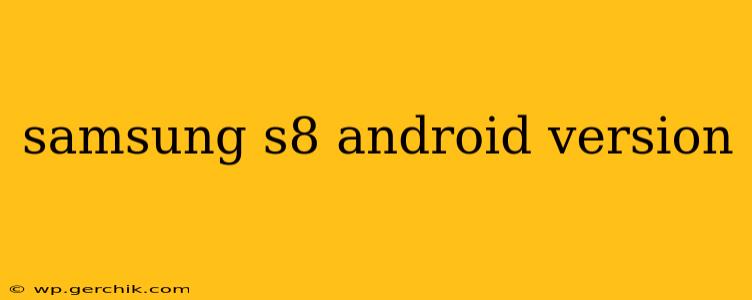The Samsung Galaxy S8, a flagship phone released in 2017, initially launched with Android 7.0 Nougat. However, its lifespan extended far beyond its initial release, receiving several significant Android OS updates. Understanding which Android version your S8 is running and what that means for its functionality and security is crucial. This guide will delve into the Android versions the S8 supported, the update timeline, and answer frequently asked questions.
What Android Version Did the Samsung Galaxy S8 Launch With?
The Samsung Galaxy S8 originally shipped with Android 7.0 Nougat. This version introduced features like improved notification management, multi-window support, and data saver capabilities. While groundbreaking at the time, it's important to remember that technology evolves rapidly, and security updates become increasingly vital as time progresses.
What Was the Latest Android Version for the Samsung Galaxy S8?
Samsung committed to providing substantial software support for the Galaxy S8, ultimately upgrading it to Android 9 Pie. This update brought significant performance improvements, refined user interface elements, and crucial security patches. While some users might have hoped for an Android 10 update, Android 9 Pie represented the final major OS upgrade for this device.
How Can I Check My Samsung Galaxy S8's Android Version?
Checking your Android version is a simple process. Here’s how:
- Open Settings: Locate and tap the "Settings" app icon (usually a gear icon).
- Navigate to About Phone: Scroll down and select "About Phone" or a similarly named option.
- Find Software Information: Look for "Software Information," "Android Version," or a similar label. This will clearly display the current Android version installed on your device.
Did the Samsung Galaxy S8 Receive Security Updates After Android 9 Pie?
Even after the final major OS upgrade to Android 9 Pie, the Samsung Galaxy S8 continued receiving security updates for a considerable period. These updates addressed vulnerabilities and patched security holes, ensuring your device remained protected from potential threats. However, this extended security support eventually came to an end, signifying the device reached its end-of-life in terms of official updates. It's important to note that the exact timeframe for these updates varied based on region and carrier.
Why Doesn't My Samsung Galaxy S8 Have the Latest Android Version?
The Samsung Galaxy S8's hardware limitations and the company's update policy explain why it didn't receive later Android versions like Android 10 or beyond. The older hardware might not have been capable of handling the resource demands of newer operating systems. Furthermore, software manufacturers typically prioritize updates for their newer devices, focusing resources and development efforts on supporting the latest models.
Is it Safe to Use a Samsung Galaxy S8 with an Older Android Version?
While using an older Android version on a Samsung Galaxy S8 might seem acceptable, it's strongly discouraged for security reasons. Without ongoing security updates, your device becomes increasingly vulnerable to malware, hacking attempts, and data breaches. While the phone may still function adequately, the security risks are far too significant to ignore.
Should I Upgrade to a Newer Phone?
Given the lack of official software support for the Samsung Galaxy S8, upgrading to a newer device is highly recommended for enhanced performance, security, and access to the latest features. Newer phones offer superior processing power, improved battery life, advanced security features, and access to the latest Android versions with regular security updates.
This comprehensive guide offers clarity on the Samsung S8's Android version history and associated considerations. Remember, prioritizing your device's security is paramount, and staying informed about updates is vital for maintaining a safe and functional mobile experience.
